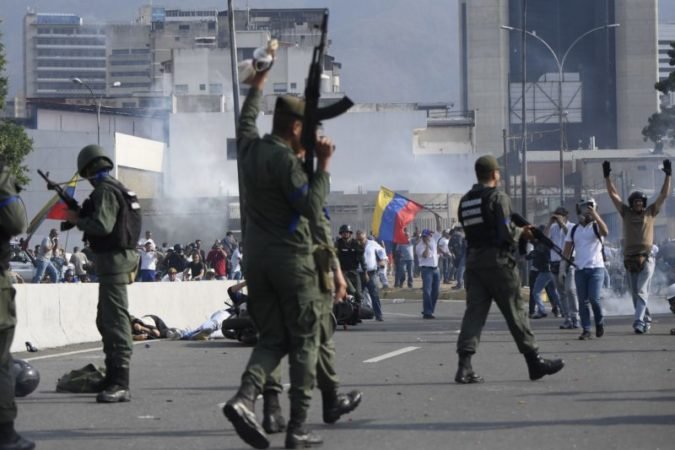Venezuela Crisis: Can India become a potential mediator?

Venezuela claimed earlier this month that they foiled an attempted coup against President Nicholas Maduro. The Maduro administration claimed their military neutralised an amphibious assault force trying to storm into the country from the North, neutralising eight and taking captive 13 who they described as “terrorist mercenaries”. The captives include two US nationals, both said to be military veterans.
The episode has taken the United States-Venezuela confrontation to a new high as the Venezuelan President blamed the United States for the coup. However, the Trump administration has denied any involvement but has said it will use “every tool” to get their nationals back.

The Associated Press has reported that the coup’s ringleader is a former Venezuelan general named Cliver Alcala who is now in US custody where he is facing trial for narcotics-related charges. He had been in charge of Venezuelan deserters in Columbia committed to overthrowing President Maduro. These deserters trained under a former US Army veteran, Jordan Goudreau, who retired in 2016 to start a private security company named Silvercorp USA that planned and executed the failed armed incursion with Gen. Alcala.

In a televised address, President Maduro showed US passports and other identification documents of the two captured US nationals, identified as Airan Berry and Luke Denman, who have confessed to be associates of Jordan Goudreau. In a Venezuelan state television broadcast, Mr Denmen was shown confessing to plotting to overthrow Venezuelan President’s regime and bringing him to the United States where he is wanted on narcoterrorism charges. Mr Denmen also said he was hired to train Venezuelan deserters in Colombia.
The plot initially hoped for US support as the White House has derecognised the Maduro administration and has backed his rival Juan Guaido along with 65 other countries. It has been reported that the initial plan was to mount a two-part operation involving 300 men, an air assault from US-supplied helicopters and employing heavy firepower. The final assault, however, included just 60 men who attempted to infiltrate on two boats but were intercepted by the Venezuelan military. The execution never matched its initial grand plans as the US never pledged its support.

The coup has been ridiculed by experts. “To call it an amateur operation would be very, very generous,” Mr Fernando Cutz, former Director for South America at President’s Trump’s National Security Council, told Vox.
This is, however, not the first time the Maduro administration has faced violent plots. The country has been bogged down in a political crisis for some years now and the failed incursion is only the latest in the series of plots against President Maduro. In 2017, a rogue helicopter pilot lobbed grenades at the Venezuelan Supreme Court and Ministry of Interior and robbed weapons in a raid on a military post. In 2018, drones attacked a military parade that Venezuelan leader was presiding. In January 2019, sections of the military attempted a revolt. Later in the same year, President Maduro’s US-backed rival Juan Guaido himself took to streets to lead an armed uprising that eventually failed as well.
None of these has borne fruit, highlights Mr Vincente Quintero, a cultural and political analyst based out of Caracas, Venezuela. He points out that it has been a year and a half since the Trump administration’s recognition of Venezuela’s leader of opposition Juan Guaido as President of Venezuela but doing this President Maduro has since only grown stronger.
“The Venezuelan Opposition had promised the Trump administration a lot but has not delivered satisfactory results. It is perhaps now time for the United States to find a new leader in the Opposition or to start talks with moderate factions of the Maduro regime,” says Mr Quintero.
He adds that it’s an election year and it may be too risky for American President to push relations with Venezuela to a new low, suggesting that the credibility of the presidency is at risk and President Trump is in need of a face-saving in Venezuela before the election later this year, even if the face-saving comes without President Maduro’s ouster.
To mediate in the crisis, Mr Quintero says India is among the best-placed countries as it is among main strategic partners of both Venezuela and the United States.

New Delhi never joined the US-led bloc that recognised Mr Maduro’s rival Juan Guaido. Venezuela has been a key supplier of crude oil to India and has also joined the International Solar Alliance. India has also invested in the country’s oil assets.
Mr Quintero says, “For the sake of peace and long-term influence on Venezuela as a stable friend and a potential partner in economic growth, India can be viewed as a potential mediator, even though India is perceived as an adversary of China, one of Venezuela’s main strategic allies. Other potential mediators include the likes of Norway, Canada, Mexico, and the Vatican, but India may be in a better position to assume a balanced role as a mediator as agreements negotiated with India would be accepted by the main geopolitical actors involved in the conflict.”


















